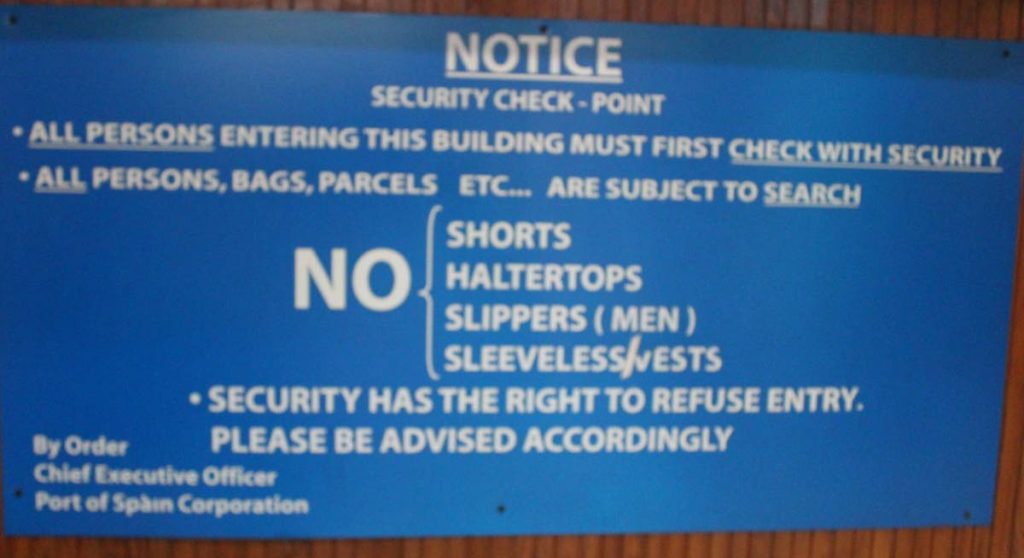UP IN ARMS: TT weighs in on ‘sleeveless’ controversy

LISA ALLEN-AGOSTINI
Feminists in Jamaica have called it variously “stupid” and “torturous” that women are mandated to wear clothes with sleeves to enter government offices and institutions.
Here in TT similar rules exist. Signs at the Ministry of National Security Immigration Division offices and elsewhere bans visitors from wearing sleeveless clothing –as well as short dresses, short pants and slippers. The website ttparliament.org names “armhole T-shirts,” “slippers,” “short pants” and “track pants” among other offensive wear.
Newsday asked a number of people what they thought of such rules. Feelings on the topic are mixed. Some say there’s a time and a place for everything and visitors should stick to the dress code. Others say it violates people’s rights—and is downright backward as well as inconvenient.
Giselle Laronde-West, former Miss World and a protocol expert, said in response to an e-mailed question on December 19, “I am not aware of a written rule in TT. It used to be an accepted norm years ago that a woman should not be sleeveless in the workplace [as] part of workplace etiquette – I guess thinking of hygiene. However, times have changed.
“I still feel personally that underarms should be hidden in the workplace; there are so many options anyway: a short jacket, long jacket, cardigan, cap sleeves, etc. Mind you, we are in the tropics and I guess some people prefer to have their arms exposed. However, if there are rules in the workplace they should be accepted.”

Not everyone shares that view. “It’s really awful,” said sexual and reproductive health activist Nicole Hendrickson, who has been barred from more than one building because of the dress code. In a phone interview on December 19 she recalled being stopped at the door of the Point Fortin passport office for wearing a short, strappy dress even though it didn’t seem to fit any of the prohibited criteria on the sign outside the office.
Writer and activist Attillah Springer said in an e-mail in response to Newsday’s questions, “I got stopped in the lobby [of a ministry] and told my outfit (a vest, a knee-length cotton skirt and some cute slippers) was disrespectful to the building. I asked the security officer if the building would break down and cry at the sight of my bare shoulders.”
The Jamaican feminist furore over such rules stemmed from a November 2017 incident in which MP Lisa Hanna was reprimanded by the Speaker of the House for wearing a cap-sleeved dress in apparent contradiction of the Standing Orders.
Are such rules sexist?
Both men and women are affected in TT. In response to a Facebook post on the topic, photographer Stephen Broadbridge said, “I was not allowed into a government office in Tobago because I was in a T-shirt.” Many other men on the same thread complained of being turned away from the port and from the Licensing Office for wearing shorts or slippers.
More than one woman said she had been offered a shawl, jacket or windbreaker so she would be allowed into government offices when wearing sleeveless clothes. Media personality Errol Fabian observed on the Facebook thread, “Hard luck for man,” as nobody gives them cover-ups for their sleeveless tops.
Former head of the Public Service Reginald Dumas, in a telephone interview on December 20, said such rules had never existed when he was in the civil service more than 25 years ago.
Dumas said. “I assume it was felt by whoever brought the rule in that if you’re wearing a sleeveless top you’re not ‘properly dressed’ and you should be properly dressed to enter a government office.”
Dumas added, “I don’t know where it came from and how it spread so fast throughout the Caribbean.

“The question is, who came up with this and why?”
He pointed out that former US First Lady Michelle Obama was known for wearing sleeveless dresses. “She would be allowed into the White House, but she wouldn’t be allowed into a government office here.”
Another former civil servant, who now works in the financial sector, said in a private social media message, “The challenge with easing dress restrictions – as we’ve experienced here at my employer – is that there will always be somebody who will push leeway to the limit and then Peter pays for Paul when the loosening is pulled back.
“Because you know somebody will turn up at Licensing in pumpum shorts, barefoot and in their string bikini top on their way to Maracas because they realised that morning that their permit expired.”
Stylist and designer Peter Elias also came down on the side of the dress code. “Maybe I’m old fashioned or just enjoy seeing layers,” he said, via private message on Facebook. “Sleeveless is not suitable [for government offices]... next, guys may be wearing ‘muscle-tees’.”
Jokes aside, some feel the issue seriously impinges on human rights.
Dr Gabrielle Hosein, head of the Institute for Gender and Development Studies at UWI, St Augustine, wrote in her e-mail response to the question, “Preventing women from accessing state agencies and services because of sleeveless dresses or tops continues a long history of colonial policing of women’s bodies in ways that assume black and brown women’s lack of respectability and the need for them to be clothed in respectable ways in order to access citizenship.
“It’s an old position that colonial rules of dress humanise those who don’t have a right to inclusion, making them into proper subjects deserving of recognition and rights. This kind of rule is classist, but also inappropriate for the Caribbean today.
“All citizens have a right to services and to government offices, and rules about sleeveless dresses are simply legacies of gendered bias and exclusion which are outmoded and unnecessary today.”
Springer indicated the dress codes could be more than classist and sexist.
“If we really analyse this obsession with presentability we will find a backward notion that casual wear –especially among black people – is a sign of poverty, lack of education, classlessness. Indeed, this is usually the excuse used to stop black people from getting into nightclubs when white patrons can wear whatever they like.”

Comments
"UP IN ARMS: TT weighs in on ‘sleeveless’ controversy"